In today’s fast-paced, cognitively demanding world, mental clarity is an increasingly valuable commodity. From professionals striving for peak performance to students managing rigorous academic workloads, the ability to think clearly, focus deeply, and retain information effectively has become a critical component of success. Nutrition plays an indispensable role in optimizing brain function, and among the key nutrients gaining attention is choline. While traditionally associated with animal-based foods like eggs and liver, choline is also available through a variety of plant-based and vegetarian-friendly options. As more individuals adopt vegan or vegetarian lifestyles, the demand for accessible, non-animal choline sources has grown. This article explores how plant-based nutrition can unlock brain power by focusing on vegan and vegetarian sources of choline that support mental clarity and cognitive resilience.
You may also like: Citicoline vs Alpha GPC: Which Choline Source Offers the Greatest Cognitive Support?
Understanding Choline’s Role in Cognitive Health
Choline is an essential nutrient that functions as a precursor to acetylcholine, a neurotransmitter involved in memory, learning, and muscle control. It also supports the structural integrity of cell membranes, methylation processes, and lipid transport. Despite its vital functions, many people, especially those on plant-based diets, fall short of the recommended intake. Choline deficiency has been associated with symptoms such as brain fog, poor concentration, mood swings, and in severe cases, liver dysfunction and muscle damage. This underscores the importance of integrating choline-rich foods into one’s diet to maintain optimal neurological and physiological health.
While the liver can produce small amounts of choline, dietary intake is the primary source of this nutrient. The U.S. Institute of Medicine recommends a daily choline intake of 550 mg for men and 425 mg for women. For vegetarians and vegans, achieving this intake without animal products requires intentional dietary planning and an understanding of which foods offer the highest choline content. The good news is that various plant-based options can help close this nutritional gap when consumed thoughtfully and consistently.
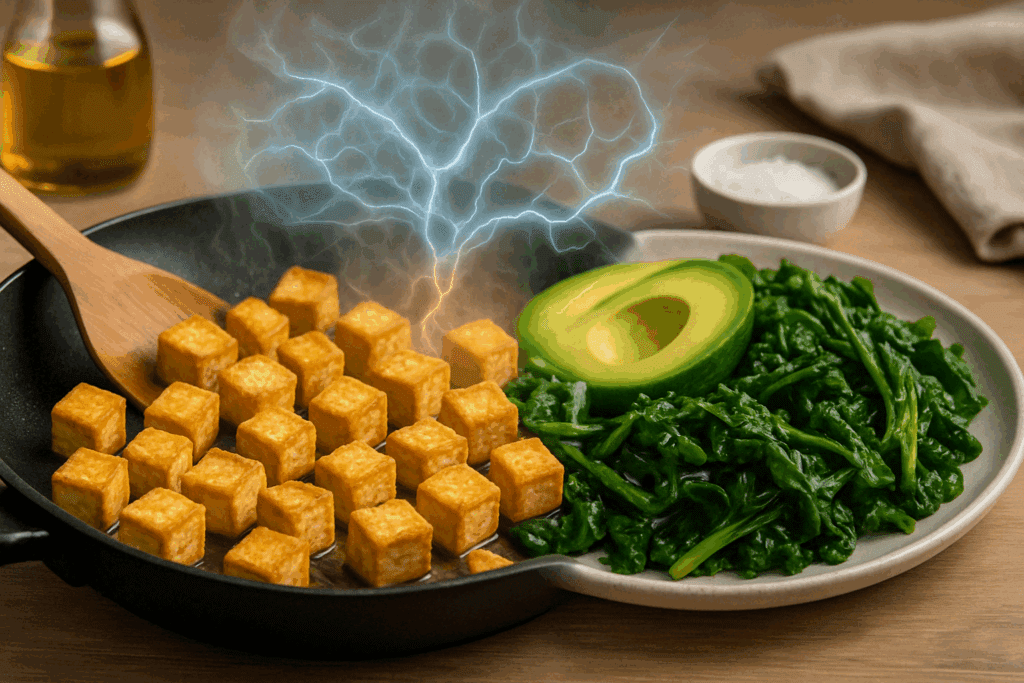
Choline in Tofu: A Versatile Cognitive Ally
Among plant-based protein sources, tofu stands out not only for its amino acid profile but also for its choline content. Tofu, made from soybeans, contains approximately 65 mg of choline per cup, making it one of the more potent vegan sources of choline. Its versatility in cooking—from savory stir-fries to breakfast scrambles—allows for easy integration into diverse meals throughout the day. Tofu’s nutritional density, including high levels of iron, calcium, and plant-based protein, adds to its appeal as a brain-friendly food.
The benefits of choline in tofu extend beyond its contribution to neurotransmitter synthesis. Soy-derived foods contain isoflavones, which may offer neuroprotective effects by modulating estrogen receptors in the brain. These compounds have been studied for their potential in reducing the risk of age-related cognitive decline. Including tofu in a balanced vegan or vegetarian diet thus provides a dual advantage: supplying essential choline while enhancing cognitive defense mechanisms.
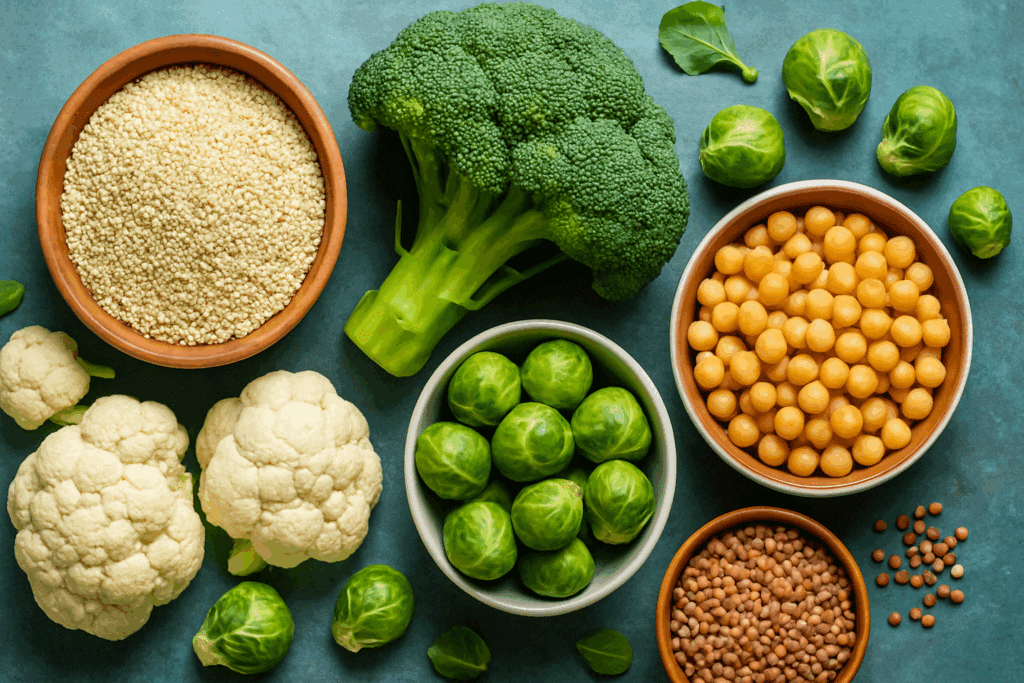
Vegan Sources of Choline: Going Beyond the Obvious
For individuals adhering to a strict vegan diet, it’s crucial to identify multiple choline-rich foods to meet daily nutritional requirements. In addition to tofu, other viable vegan sources of choline include quinoa, Brussels sprouts, broccoli, cauliflower, and legumes such as chickpeas and kidney beans. These foods, while not as concentrated in choline as animal products, can contribute meaningful amounts when consumed in combination. For example, a cup of cooked quinoa offers around 43 mg of choline, while a cup of steamed broccoli contains approximately 63 mg.
Understanding how to combine these vegan sources of choline in a day’s meal plan is essential for achieving adequacy. A breakfast smoothie with peanut butter, a quinoa salad at lunch, a tofu stir-fry for dinner, and snacks that include roasted chickpeas or hummus can collectively deliver a substantial portion of the daily requirement. Furthermore, these foods often come packaged with additional brain-boosting nutrients like folate, magnesium, and antioxidants, making them powerful allies for mental clarity and overall neurological health.
Vegetarian Sources of Choline: A Broader Nutritional Landscape
Vegetarians, unlike vegans, may consume eggs and dairy, offering additional flexibility in sourcing choline. Eggs, especially yolks, are the most concentrated natural source, with one yolk delivering over 125 mg of choline. For those who include eggs in their vegetarian diet, incorporating one to two eggs daily can help meet more than half of their choline needs. Dairy products such as milk, yogurt, and cheese also contribute modestly, though their choline content is significantly lower than that of eggs.
Still, many vegetarian sources of choline mirror those available to vegans, including tofu, legumes, cruciferous vegetables, and whole grains. Emphasizing variety is essential, not only to cover choline requirements but to support a broad spectrum of nutrients vital for cognitive function. A vegetarian meal plan that strategically includes eggs, beans, and a medley of vegetables can offer both quantity and quality in choline intake. When paired with vitamin B-complex nutrients, which assist in choline metabolism, this approach becomes even more effective in maintaining mental sharpness.
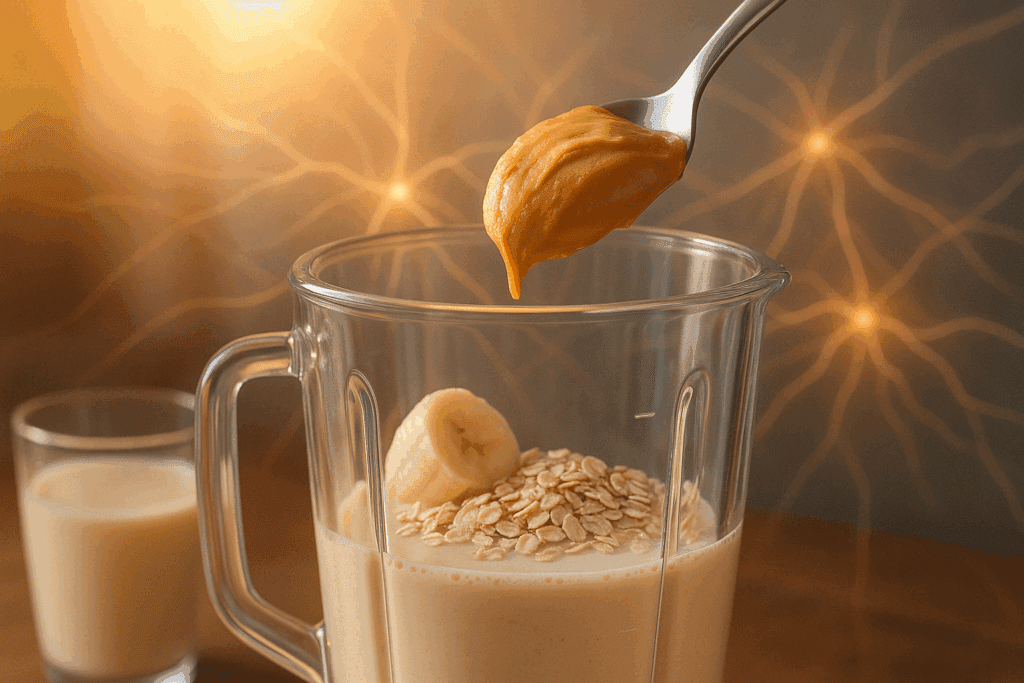
Choline Peanut Butter: A Surprisingly Effective Option
One unexpected yet effective contributor to plant-based choline intake is peanut butter. Though often celebrated for its protein and healthy fat content, peanut butter also provides approximately 20 mg of choline per two-tablespoon serving. While not a choline powerhouse in isolation, its widespread popularity and ease of use make it a convenient way to supplement daily intake. Incorporating choline peanut butter into oatmeal, smoothies, or sandwiches can subtly and deliciously support brain function.
Beyond its choline contribution, peanut butter contains vitamin E and monounsaturated fats that support cardiovascular health and, by extension, cerebral circulation. Healthy blood flow to the brain is a foundational element in sustaining mental clarity and preventing cognitive fatigue. When selecting peanut butter for cognitive health, it is best to opt for natural varieties without added sugars or hydrogenated oils, which can undermine its benefits.
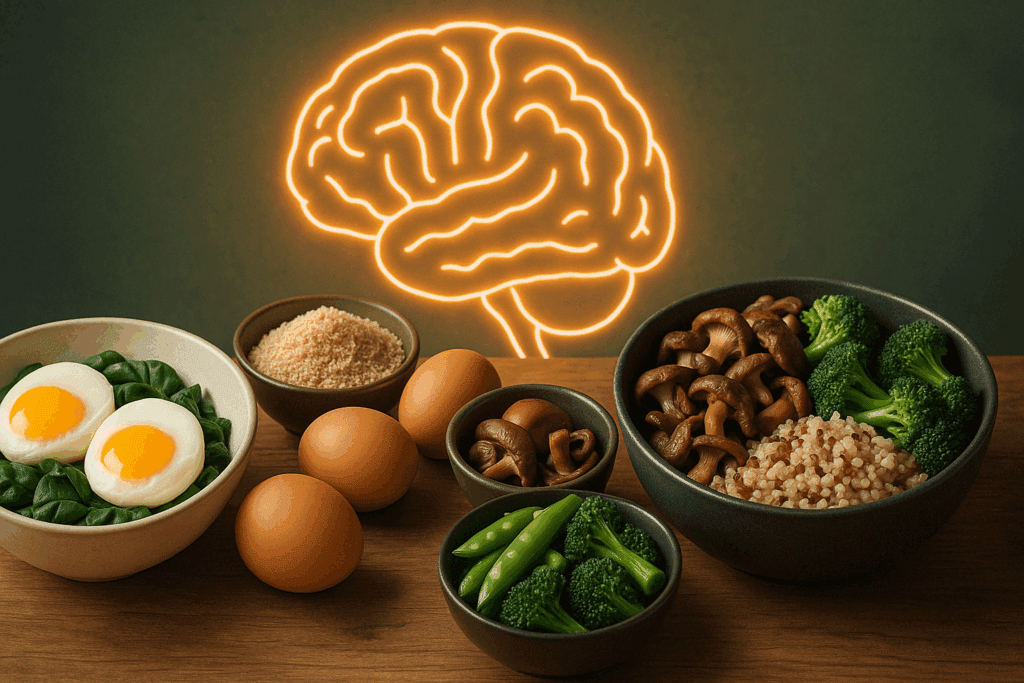
Choline-Rich Foods for Vegetarians: A Whole-Diet Approach
Crafting a choline-rich vegetarian diet requires a comprehensive, whole-food approach that considers both macronutrient balance and micronutrient density. Choline rich foods vegetarian eaters should focus on include not only eggs and dairy but also nuts, seeds, legumes, whole grains, and green vegetables. For example, wheat germ offers a notable 152 mg of choline per 100 grams, while shiitake mushrooms and soy milk contribute modest but meaningful amounts.
Meal planning that emphasizes layering these ingredients throughout the day helps ensure cumulative adequacy. A breakfast featuring fortified soy milk and wheat germ cereal, a lunch salad topped with hard-boiled eggs and chickpeas, and a dinner incorporating sautéed mushrooms and quinoa can easily surpass 400 mg of choline. This method also reinforces other essential cognitive-supporting nutrients like zinc, iron, and omega-3 fatty acids, creating a nutritional synergy that boosts the effectiveness of choline in brain function.
Choline Foods Vegan Diets Can Rely On
A common misconception is that plant-based diets inherently lack critical nutrients like choline. While it’s true that animal products offer higher concentrations, there are still many choline foods vegan diets can rely on to maintain brain health. Fortified plant-based milks and meat alternatives often include added choline, bridging gaps where whole foods may fall short. Additionally, nutrient-dense staples like edamame, almonds, lentils, and flaxseeds can be integrated strategically to boost daily intake.
For those facing difficulty reaching target levels, supplementation is a practical option. Choline bitartrate and alpha-GPC are two vegan-friendly supplements that provide bioavailable choline. However, supplements should be considered a complement to, rather than a replacement for, a nutrient-rich diet. Whole foods offer a range of co-factors that enhance absorption and long-term health outcomes. As always, supplementation should be approached in consultation with a healthcare provider, especially for individuals with unique metabolic needs or pre-existing conditions.
The Place of Salmon Choline in Flexitarian Diets
Although salmon is not part of a vegan or strict vegetarian diet, it merits brief mention for those practicing a flexitarian or pescatarian approach. Salmon choline content is remarkably high, with a 3-ounce serving delivering more than 75 mg. In addition to being rich in choline, salmon is a superior source of DHA, an omega-3 fatty acid that works synergistically with choline to enhance neuronal membrane fluidity and synaptic function. The inclusion of salmon in a semi-vegetarian diet can dramatically bolster cognitive performance, particularly in older adults or individuals recovering from neurological strain.
For those not strictly avoiding animal products, occasional consumption of salmon can serve as a highly effective nutritional intervention. Combining salmon with other choline-rich plant foods creates a well-rounded dietary strategy that supports both physical and cognitive resilience. However, the same nutritional benefits can be largely approximated with a carefully planned vegan or vegetarian diet augmented by fortified foods and high-quality supplements.
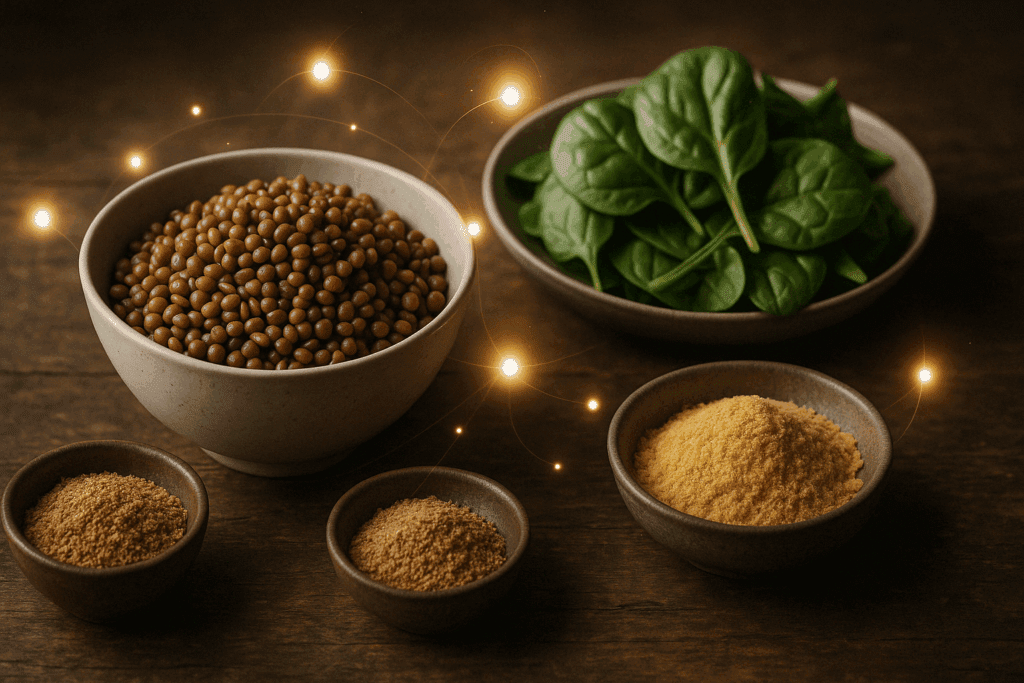
Enhancing Mental Clarity Through Strategic Nutritional Pairings
Choline absorption and utilization are influenced by several co-factors that should not be overlooked when designing a brain-boosting plant-based diet. Nutrients such as folate, vitamin B12, and omega-3 fatty acids play supportive roles in choline metabolism and brain function. Vegetarians typically obtain B12 from dairy and eggs, while vegans must rely on fortified foods or supplements. Similarly, plant-based omega-3s like ALA from flaxseed or chia must be converted into DHA and EPA—a process that is inefficient in the human body.
To enhance mental clarity and cognitive energy, it is wise to include foods that collectively supply these synergistic nutrients. A choline-rich meal that includes lentils, spinach, and flaxseeds, paired with a B12-fortified nutritional yeast, represents one example of this holistic nutritional strategy. This kind of mindful pairing not only ensures choline adequacy but supports overall neurochemical balance, mitochondrial efficiency, and synaptic integrity. In essence, it is not just about how much choline you consume, but how well your body can utilize it in the context of a balanced, nutrient-dense diet.
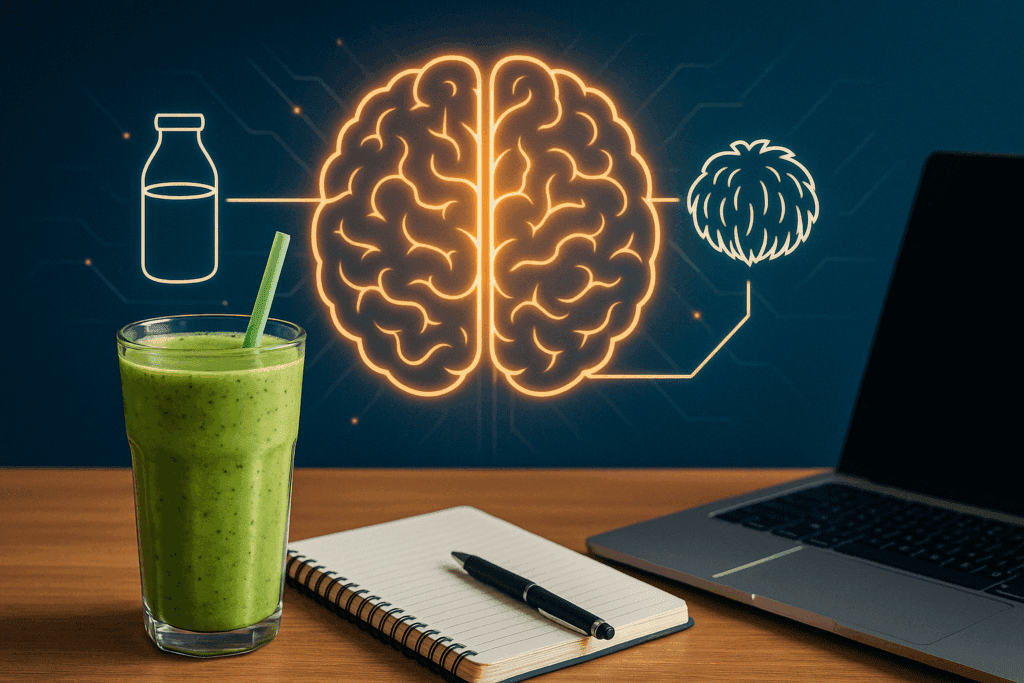
Cognitive Health and the Emerging Science of Plant-Based Nootropics
The rise of plant-based nootropics further supports the viability of vegan and vegetarian diets in promoting mental performance. Botanical compounds such as lion’s mane mushroom, rhodiola rosea, and bacopa monnieri have demonstrated neuroenhancing effects in various clinical and preclinical studies. While these are not direct sources of choline, they complement choline’s cognitive functions by modulating neurotransmission, reducing inflammation, and supporting neurogenesis.
In combination with choline-rich plant foods, these natural nootropics can create a powerful dietary protocol for sustained mental performance. For example, a morning smoothie that includes soy milk, peanut butter, and lion’s mane extract offers a cognitive trifecta: choline, healthy fats, and neurotrophic support. This integrative approach reflects a growing trend in nutritional neuroscience, which recognizes the importance of whole-diet patterns over isolated nutrients. Embracing this philosophy allows for greater personalization and adaptability in achieving cognitive goals through plant-based living.
Frequently Asked Questions: Vegan and Vegetarian Choline for Cognitive Health
1. How can people following a plant-based diet maximize the benefits of choline in tofu?
Tofu is a surprisingly rich plant-based source of choline, particularly useful for those avoiding animal products. To get the most cognitive benefit from choline in tofu, it’s ideal to consume it alongside other supportive nutrients such as vitamin B6, folate, and omega-3s. These co-nutrients help optimize choline metabolism and its conversion into acetylcholine, the neurotransmitter responsible for memory and learning. For practical application, tofu can be integrated into meals that include leafy greens, ground flaxseed, or fortified nutritional yeast. This approach not only leverages the choline content of tofu but also enhances its bioavailability through synergistic nutritional support.
2. What are some advanced techniques for boosting intake of vegan sources of choline without relying on processed products?
One effective strategy is to combine diverse vegan sources of choline in daily meal rotation. Instead of leaning on fortified, processed foods, you can blend whole-food options like quinoa, lentils, cauliflower, and almonds into a cohesive dietary plan. Fermentation is another advanced method; fermented legumes and grains may improve choline absorption and digestive efficiency. Culinary techniques such as sprouting lentils or steaming cruciferous vegetables help preserve their choline content. By layering these methods, individuals can meet their choline needs with minimally processed, nutrient-rich vegan foods that support long-term cognitive health.
3. How do vegetarian sources of choline compare in mental health outcomes to omnivorous diets?
While omnivorous diets naturally provide more bioavailable choline through animal products, well-planned vegetarian sources of choline can match their cognitive benefits over time. Studies suggest that consistent intake of eggs, dairy, and plant-based ingredients like soy and whole grains in a choline vegetarian diet helps maintain acetylcholine synthesis and supports brain plasticity. Mental health outcomes may differ slightly depending on co-nutrient intake such as vitamin B12, which is often lower in vegetarian populations. However, supplementing wisely and emphasizing diversity among vegetarian sources of choline can create a neuroprotective effect comparable to that of omnivores. Moreover, some vegetarians report enhanced cognitive stability when focusing on anti-inflammatory, choline-rich plant foods.
4. Are there specific populations who benefit most from choline-rich foods in a vegetarian diet?
Yes, choline rich foods vegetarian diets are especially beneficial for pregnant individuals, older adults, and students undergoing intense cognitive demands. For expectant mothers, adequate choline supports fetal brain development, and vegetarian diets that include eggs, soy, and legumes can help fulfill this critical need. Aging adults also benefit from increased choline intake, as it helps mitigate cognitive decline and supports memory retention. Students or professionals with high mental workloads may experience improved focus and recall when choline vegetarian foods are regularly included in meals. In each of these populations, combining choline with nutrients like DHA and magnesium can further amplify its cognitive benefits.
5. Can choline peanut butter realistically contribute to daily choline targets in a vegan diet?
Yes, while not a standalone solution, choline peanut butter can be a surprisingly strategic contributor to overall choline intake. Two tablespoons of natural peanut butter provide around 20 mg of choline, which makes it easy to incorporate into snacks, smoothies, or oatmeal. Its convenience and shelf stability offer an accessible way to introduce more choline foods vegan individuals can enjoy without meal prepping. When combined with other high-choline vegan staples like soy milk or lentils, peanut butter enhances both taste and nutrient density. For optimal brain health, look for unsweetened, minimally processed varieties to avoid added sugars or trans fats.
6. How should people approach tracking choline from multiple vegan sources in their diet?
Tracking choline intake can be nuanced since labels often omit it. However, using reliable databases like the USDA FoodData Central or nutrition-tracking apps that include micronutrient breakdowns can help identify cumulative choline consumption. Planning meals that intentionally incorporate diverse vegan sources of choline, such as tofu, chickpeas, and quinoa, ensures a consistent daily intake. It also helps to rotate between high- and moderate-choline foods to reduce dietary monotony while meeting nutritional goals. Some individuals use spreadsheet templates to monitor intake trends and ensure they’re not relying too heavily on any one food source.
7. What makes salmon choline noteworthy even in primarily vegetarian or semi-plant-based diets?
Salmon choline stands out due to its high bioavailability and pairing with omega-3 fatty acids, particularly DHA, which is critical for cognitive function. In flexitarian or pescatarian diets, including salmon once or twice a week can serve as a potent brain health intervention. Its choline content can help make up for shortfalls on days when plant-based foods fall short of the target. While vegetarians may not consume salmon, understanding its value helps in comparing and optimizing plant-based strategies. For those open to fish, rotating salmon with plant-rich meals allows for a hybrid approach that supports both ethical food choices and cognitive performance.
8. Are there overlooked vegan foods that are unexpectedly good sources of choline?
Absolutely. While mainstream advice often focuses on tofu and legumes, several lesser-known vegan sources of choline deserve more attention. For instance, amaranth, a pseudo-grain, offers both protein and choline. Shiitake mushrooms provide a modest amount and pair well with quinoa and tempeh in stir-fries. Additionally, edamame, beyond its protein benefits, offers notable choline per serving. Exploring these overlooked foods enables a more dynamic approach to choline foods vegan diets can thrive on, especially when aiming for nutritional variety.
9. How can athletes on a choline vegetarian diet optimize both performance and brain health?
Athletes can greatly benefit from a choline vegetarian diet by prioritizing foods that support both muscular endurance and mental clarity. Choline is essential for neuromuscular signaling, making it a performance-enhancing nutrient when paired with complex carbs and electrolytes. Vegetarian-friendly options like eggs, lentils, and soy-based products help meet post-exercise choline needs. Incorporating choline peanut butter into pre-workout snacks provides both cognitive and metabolic fuel. Athletes should also pay attention to hydration and include B-complex vitamins to ensure choline metabolism functions efficiently under physical stress.
10. What future innovations might improve the availability of vegan sources of choline?
The future of choline vegetarian nutrition is promising, with innovations already underway to improve access and absorption. Biotechnologists are developing biofortified crops, such as choline-enriched beans and cereals, designed specifically for plant-based diets. Advances in algae-based food technology may soon produce vegan products with enhanced choline content and improved taste profiles. Meanwhile, emerging supplement formats aim to mimic food matrix interactions, improving how the body processes choline from tablets and powders. As public awareness grows, the food industry is likely to respond with more choline-rich foods vegetarian and vegan consumers can integrate seamlessly into their routines.
Final Thoughts on Achieving Mental Clarity with Choline-Rich Plant Nutrition
As the understanding of nutrition’s role in brain health continues to evolve, it becomes increasingly clear that plant-based diets can support robust cognitive function when approached with strategy and intention. Vegan and vegetarian sources of choline, including tofu, legumes, peanut butter, and cruciferous vegetables, provide essential raw materials for neurotransmitter production, membrane integrity, and mental clarity. By leveraging fortified foods and considering smart supplementation where needed, individuals can achieve choline adequacy without compromising dietary ethics or preferences.
Understanding the nuances between choline in tofu, the value of choline peanut butter, and the broader spectrum of choline rich foods vegetarian and vegan diets can rely on, empowers individuals to craft meals that nourish both body and brain. Even those following semi-plant-based or flexitarian diets may find strategic benefits in occasionally incorporating salmon choline to enhance mental performance.
Ultimately, cognitive enhancement is not the result of a single nutrient or superfood, but the outcome of consistent, intentional choices made across the span of one’s lifestyle. With a strong foundation in plant-based nutrition, individuals can unlock sustained mental clarity and performance that supports both short-term demands and long-term brain health.
Was this article helpful? Don’t let it stop with you. Share it right now with someone who needs to see it—whether it’s a friend, a colleague, or your whole network. And if staying ahead on this topic matters to you, subscribe to this publication for the most up-to-date information. You’ll get the latest insights delivered straight to you—no searching, no missing out.
Further Reading:
Can You Boost Your Brainpower with Plant-Based Nutrition?
The 16 Best Vegan Brain Foods (From a Vegan Dietitian)
The effects of plant-based diets on the body and the brain: a systematic review
Important Note: The information contained in this article is for general informational purposes only, and should not be construed as health or medical advice, nor is it intended to diagnose, prevent, treat, or cure any disease or health condition. Before embarking on any diet, fitness regimen, or program of nutritional supplementation, it is advisable to consult your healthcare professional in order to determine its safety and probable efficacy in terms of your individual state of health.
Regarding Nutritional Supplements Or Other Non-Prescription Health Products: If any nutritional supplements or other non-prescription health products are mentioned in the foregoing article, any claims or statements made about them have not been evaluated by the U.S. Food and Drug Administration, and such nutritional supplements or other health products are not intended to diagnose, treat, cure, or prevent any disease.


